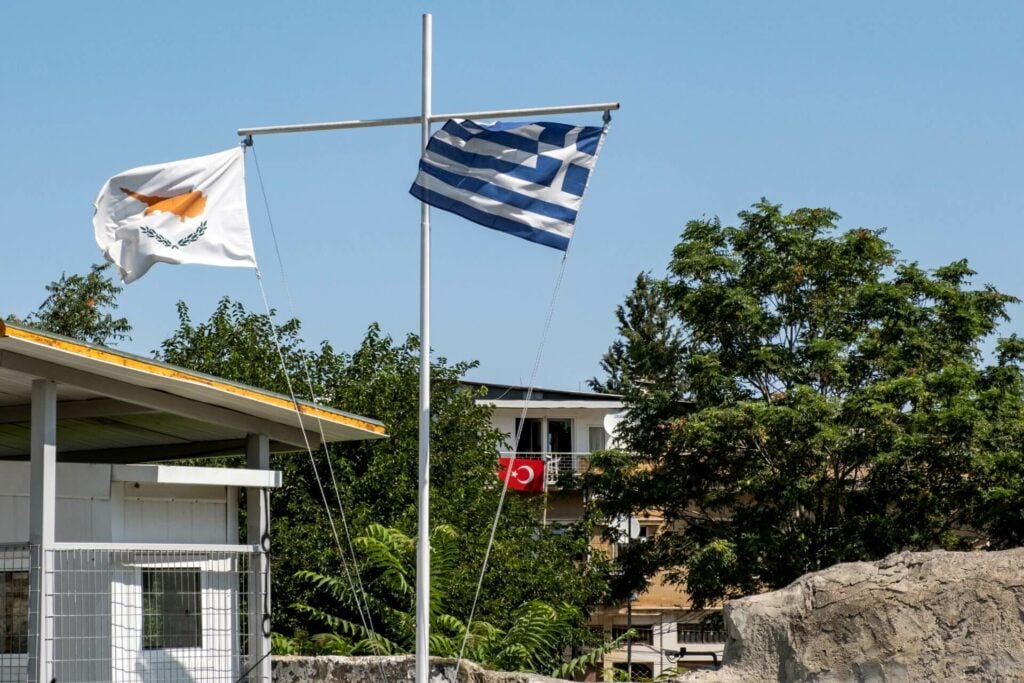As the tenure of US President Joe Biden nears its end, the American Hellenic Institute (AHI), a non-profit Greek American think tank and public policy center, has in a letter called on him to use the final days of his administration to help resolve the conflict over the divided island of Cyprus.
AHI, in its letter dated November 25, stressed the urgency of addressing the long-standing Cyprus issue and Turkey’s actions that “undermine” US regional interests in the eastern Mediterranean region.
Neighbors Greece and Turkey, both NATO allies but historic foes, have been at odds for decades over a range of issues from airspace to maritime jurisdiction in the eastern Mediterranean and ethnically split Cyprus.
Cyprus has been mired in a protracted dispute between Greek Cypriots and Turkish Cypriots despite multiple diplomatic efforts aimed at reaching a comprehensive settlement. The conflict intensified in 1974, when a Greek Cypriot coup seeking to unify the island with Greece prompted Turkey’s military intervention, under its role as a guarantor power to protect Turkish Cypriots. The Turkish Republic of Northern Cyprus (KKTC) was declared in 1983 but remains recognized only by Turkey.
The letter recalled the significance of the 50th anniversary of Turkey’s military intervention in Cyprus, which divided the island, urging Biden to use this pivotal moment to make a lasting impact on the situation.
Biden will hand over his post to US President-elect Donald Trump, who will be sworn in at his inauguration on January 20.
AHI said that the US has a crucial role to play in advancing a peaceful resolution to the Cyprus conflict, one based on international law and US legal frameworks, while countering Turkey’s actions that undermine regional stability. The institute also called for further strengthening US-Cyprus relations, particularly through enhanced military and defense cooperation.
Cyprus President Nikos Christodoulides said on Thursday that his country is aiming to join NATO and is in talks with the United States to meet the conditions for entering the military alliance.
While AHI commended the Biden administration for establishing the US-Cyprus Strategic Dialogue, which has advanced bilateral defense cooperation, it recommended additional steps to solidify Cyprus’ role as a strategic NATO partner. This includes advocating for Cyprus’ integration into NATO’s Mediterranean Dialogue and supporting its participation in NATO’s Individually Tailored Partnership Programs (ITPPs).
The NATO Mediterranean Dialogue, launched in 1994, is a framework for cooperation between NATO and several countries in the Mediterranean region, including Algeria, Egypt, Israel, Jordan, Mauritania, Morocco and Tunisia.
The ITPPs are designed to allow NATO and its partners to tailor their cooperation to their specific security needs and interests, going beyond the standard partnership frameworks. Through the ITPPs, NATO can work with partner countries to develop targeted programs and activities that address their unique defense and security requirements.
Turkey’s increasing alignment with authoritarian regimes
The letter also talked about Turkey’s growing alignment with authoritarian regimes and its increasing isolation from Western alliances. AHI pointed out that Turkey has strengthened ties with Russia and Iran — two US adversaries — and has supported Iran-backed terrorist organizations such as the Palestinian militant group Hamas. This shift, coupled with Turkey’s opposition to Western multilateral structures and its bid to join BRICS, is seen as a direct challenge to US interests and regional stability.
The letter also raised concerns about the erosion of democratic values under President Recep Tayyip Erdoğan’s government, including the suppression of political opposition and violations of human rights. The organization warned that unless Turkey is held to account for its actions, its provocative behavior in the eastern Mediterranean could escalate, threatening both NATO cohesion and US interests in the region.
On October 30 Cypriot President Christodoulides met with US President Biden at the White House — a notable meeting as it was the first such meeting since 1996, when President Glafcos Clerides met with then-US president Bill Clinton.

